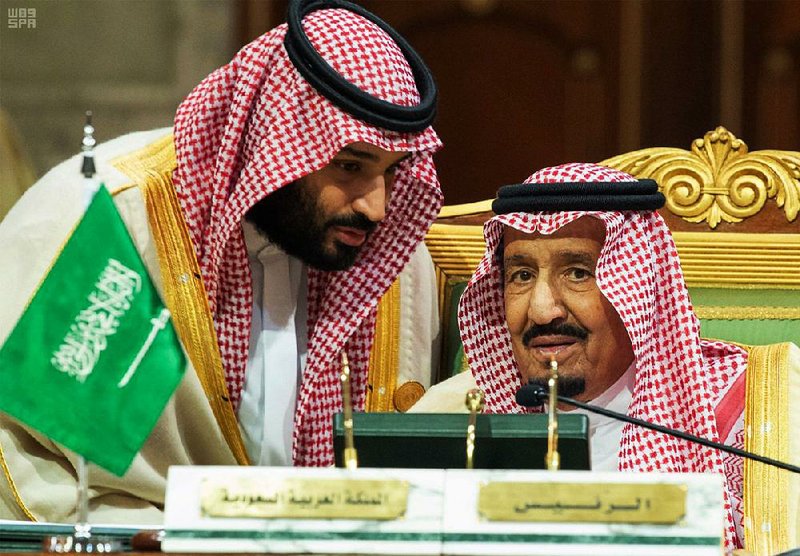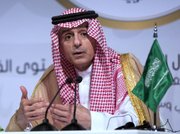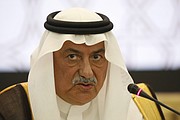BEIRUT -- King Salman of Saudi Arabia shook up the kingdom's Cabinet on Thursday, naming new ministers and security chiefs but keeping the levers of power firmly in the hands of his son and designated heir, Prince Mohammed bin Salman.
Saudi Arabia and its 33-year-old crown prince have been under heavy international scrutiny since a team of Saudi agents killed and dismembered the Saudi dissident Jamal Khashoggi inside the Saudi Consulate in Istanbul in October.
Western intelligence agencies have concluded that Mohammed bin Salman knew about and most likely ordered the plot to kill Khashoggi.
Khashoggi wrote critically of the crown prince in columns for The Washington Post before he was killed. After denying any knowledge of Khashoggi's death for weeks, Saudi authorities eventually settled on the explanation that he was killed in an operation masterminded by former advisers to Prince Mohammed. The kingdom denies the crown prince had any involvement.
The prince has also directed the Saudi military campaign in Yemen that has contributed to a humanitarian crisis and has drawn growing opposition in the West.
But the Saudi monarch, almost 83 years old, has shown no signs of lessening his son's near-total control over the kingdom. The Cabinet shake-up Thursday was no exception, as many of those promoted were close associates of Mohammed bin Salman.
New officials were named to lead the National Guard, the General Directorate of Public Security and the Information Ministry.
Among those moved in the series of royal decrees announced on Saudi state television was Adel al-Jubeir, who had become one of the best-known Saudi officials in the West in his posts as foreign minister and, previously, as ambassador to the United States.
Jubeir was removed from the position of foreign minister, but was named minister of state for foreign affairs. It was not immediately clear how his duties would change.
Ibrahim al-Assaf, a former finance minister, was appointed foreign minister.
It was not immediately clear why Jubeir's role was changed. Despite coming from a nonroyal background, he had held some of the kingdom's leading positions for maintaining its relationship with the United States, its most important ally.
Jubeir, who earned a master's degree in international relations from Georgetown University, has held a number of diplomatic posts. He rose to prominence by voicing the kingdom's perspective to the West, including during the Persian Gulf War of 1990-91 and after the terrorist attacks of Sept. 11, 2001. Most of the perpetrators of those attacks were Saudis.
He served as a translator for the previous monarch, King Abdullah, who named him ambassador to Washington. After Salman ascended to the throne in 2015, he named Jubeir foreign minister, a job that many at the time did not expect him to hold for long because he was not a prince.
Jubeir's replacement, Assaf, is well-known to international investors.
Assaf sits on the boards of oil-giant Saudi Aramco and the kingdom's sovereign wealth fund. The crown prince oversees both entities. Assaf holds a doctorate in economics from Colorado State University and a master's degree from the University of Denver, according to his biography on Aramco's website.
After serving as finance minister, he was locked in the Riyadh Ritz-Carlton last year with hundreds of princes, businessmen and officials in what the government called an anti-corruption campaign.
After his release, he attended a Cabinet meeting and then joined the Saudi delegation to the World Economic Forum meeting in Davos, Switzerland. Neither he nor the Saudi government has ever publicly explained why he was detained.
The opaque anti-corruption sweep helped Prince Mohammed consolidate power and net the government more than $13 billion in settlements.
The changes announced Thursday include aides to the crown prince, such as Musaed al-Aiban as national security adviser -- in addition to other positions he holds -- and former media minister Awwad al-Awwad as adviser to the royal court. Khalid al-Harbi was named as head of general security.
Turki al-Sheikh, a confidant of the crown prince, was removed as head of the Sports Authority and replaced by Prince Abdulaziz bin Turki al-Faisal. This means Sheikh no longer oversees a cybersecurity and programming body that was led by Saud al-Qahtani, a close aide to the crown prince who was fired from his post and sanctioned by the U.S. Treasury Department for helping to mastermind the plot that led to Khashoggi's killing.
Sheikh will now lead the General Entertainment Authority, a body created in recent years to help organize and promote concerts and other events that had long been banned in the conservative country.
Turki Shabbaneh, who has held positions in privately owned Saudi TV channels, was named minister of media. Hamad al-Sheikh, a royal court adviser and former college dean who studied in the U.S., was appointed minister of education.
The king's eldest son, Prince Sultan bin Salman, was removed as head of the tourism authority. He will lead a new national space agency. In 1985, he became the first Arab and Muslim astronaut to fly in space.
Prince Abdullah bin Bandar was named head of the National Guard. The force primarily protects the Al Saud ruling family. Prince Abdullah had been deputy governor of Mecca.
Information for this article was contributed by Ben Hubbard of The New York Times and by Aya Batrawy of The Associated Press.
A Section on 12/28/2018


